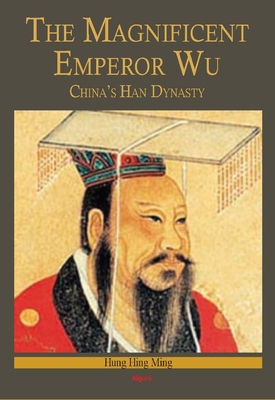
Sound Bite
One of the greatest emperors in Chinese history, Liu Che (157 BC-87 BC) is known posthumously as Emperor Wu. Under his reign China expanded its territory dramatically. Liu Che consolidated China's power under a strong central government founded on the Confucian virtues of integrity, benevolence, conscientiousness, consideration for others and correct behavior.
This book, based largely on the writings of China's ancient historian, Sima Qian, summarizes the development of the Han Dynasty and the reign of Emperor Wu.
About the Author
Hung Hing Ming studied English at Chinaâs most prestigious university in the early 1960s and went on to work as an official interpreter and translator working with the United Nationsâ Food and Agriculture Organization (FAO).
He taught English at Zhongshan University (Dr. Sun Yat San University), Guangzhou, in 1984 and again from 1987 to 1991, as an associate professor and an instructor for graduate students in the Foreign Languages and Literature Department. He was a visiting scholar at the University of California at Berkeley and at the University of Kansas from late 1984 to 1987, when he earned his Masters degree in linguistics, before returning to Zhongshan University. In 1991, Mr. Hung moved to Hong Kong where he worked as a legal translator with international law firms for close to 20 years.
Mr. Hung is writing a series of biographies to introduce some of Chinaâs most emblematic historical figures to the American public.
|
|
About the Book
UN Translator Hung Hing Ming continues to bring Chinese history to an English-speaking audience through his translations of Chinese chronicles and the writings of the early historian Sima Qian. Here, he reviews some of the major episodes of the...
UN Translator Hung Hing Ming continues to bring Chinese history to an English-speaking audience through his translations of Chinese chronicles and the writings of the early historian Sima Qian. Here, he reviews some of the major episodes of the Han Dynasty, from its founding by Liu Bang to the Lü Clan Disturbance and subsequent diplomatic overtures and military campaigns against the minor Chinese kingdoms, the Mongols, and Gojoseon (the ancient Korean Kingdom).
Across the Gobi Desert and the vast expanses of Asia, drama was never in short supply. Murder and betrayals, battles and sieges, rebellion and surrender took place all while administrative innovations helped improve life for the people. Due to the astute observations and prudent conduct of a long-term hostage, the first of the Great Silk Road trade routes were opened, paving the way for today's Belt and Road Initiative that promises to boost the economies of all in its path.
|
|
Pages 276
Year: 2020
BISAC: HIS008000 HISTORY / Asia / China
Soft Cover
ISBN: 978-1-62894-416-7
Price: USD 21.95
Hard Cover
ISBN: 978-1-62894-417-4
Price: USD 31.95
eBook
ISBN: 978-1-62894-418-1
Price: USD 21.95
|















